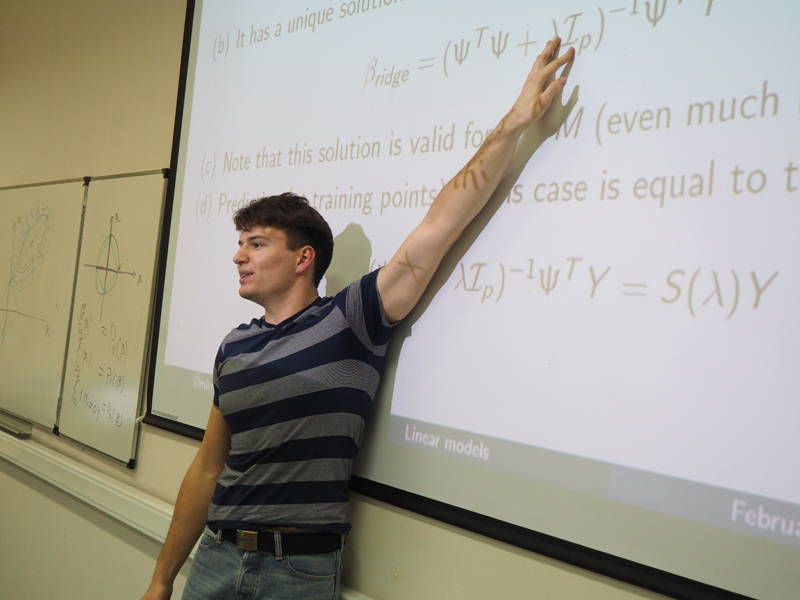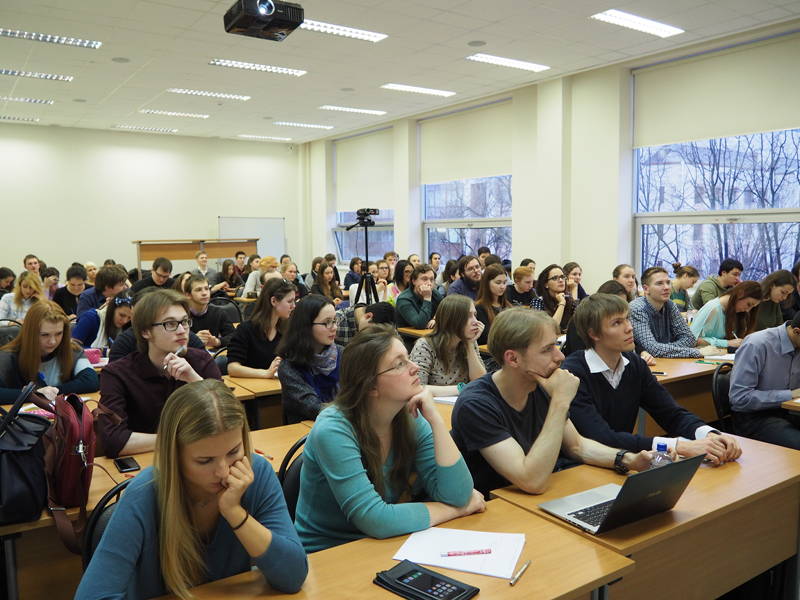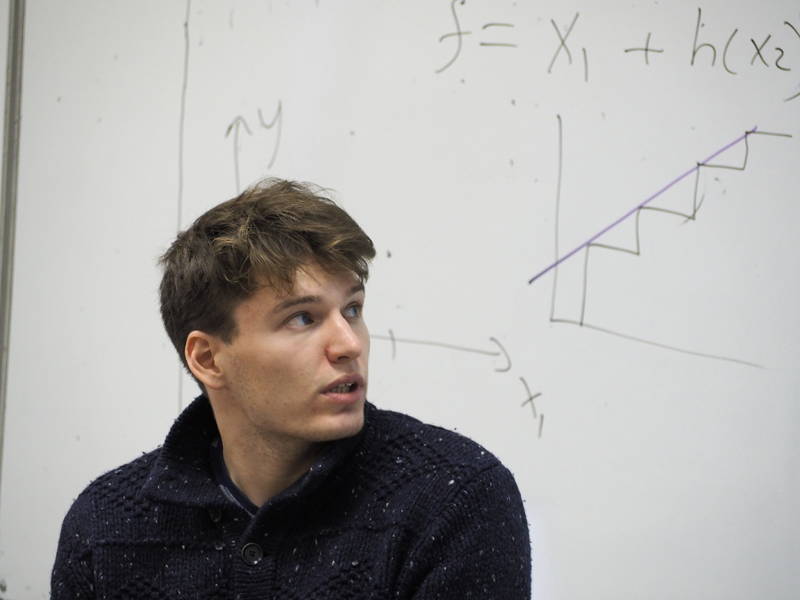successful admissions
of students enter the university of their choice
students consult Education Index when applying for universites
successful admissions
of students enter the university of their choice
students consult Education Index when applying for universites
Dmitry talks about his experience of studying at Faculty of Economics of the Moscow State University and the Stanford University and shares his thoughts about economic science.
 — Dmitry, your course was devoted to the applied statistical methods and econometrics. Why were you interested in this subject and in what way is it helpful for economists?
— Dmitry, your course was devoted to the applied statistical methods and econometrics. Why were you interested in this subject and in what way is it helpful for economists?
I will start with a little backstory. Before leaving to Stanford, I worked for Yandex (Russia's leading search engine — EI note) — I worked with auctions for selling advertisement space. You can slightly change the rules of the auction to see how it will affect the advertiser bidding behaviours and how it will eventually affect the Yandex's revenues. At first, I approached this subject only from a theoretical perspective: my Master thesis at the New Economic School (NES) was on applied microeconomics and was devoted to context advertising auctions. At Yandex I had to work with more practical tasks and I had to deal with data lot. That was the moment when I started to see econometrics not only as an academic subject but also as a useful applied tool.
Later I entered Stanford and started to take quite a lot of courses at the Department of Statistics, so I noticed one particular thing. It happens so that economic studies often have not got any results that could be applied practically. <...> However, for engineers, people specialising in computer science and biology the very same methods from the a statistics course turn out to be extremely useful from the practical perspective. They just simply apply regression analysis or something similar and magically helicopters start to fly, cancer becomes curable, patterns are recognised. Moreover, to solve all these various problems they used one single mathematic tool. So that was when I became interested in applied statistics. As a result, my degree became a curious blend between of courses on both statistics and economics, which allowed me to see a degree in economics from a different perspective. More and more often I come to a conclusion that there is a huge gap between the way we, economists, are taught to work with data and how it should be done. The focus of econometric courses are the interesting and thoroughly studied theoretic aspects, however, we know virtually nothing about new algorithms that is why they are not included into course programs. As a result, it often happens that when there is an economic problem that can be solved with the use of new methods, economists do not use them simply because they are not aware that they exist. This is the reason I think it is necessary to tell students about the new methods and discuss them, and this is what we were doing during our courses.

This is a very hard question and I do not have an answer to it. You need a mix of two things: on one hand, you need to have complex and exciting business problems and on the other hand, there need to be statistic methods. <...>. So far, I have never seen a program that would appear perfect to me, neither in Russia, nor in the USA. That is why creating a model of economic degree in data analysis is an exciting job on its own.

I believe everything went quite well. For me personally it was an extremely valuable experience. From methodological perspective, it is complicated to teach something to a diverse group of students, and my course enrolled students of the Faculty of Economics, the Faculty of Mathematics, from the New Economic School (NES), the Moscow Institute of Physics and Technology (MIPT) and etc. from second-year students to my former professors. This motivated me to better prepare for my classes. I had to rethink everything I was going to talk about, reflect it and try to look at it from a different prospective.<...>
— What you are currently working on at Stanford?
Now I am trying to combine current statistical analysis methods with present econometrical objectives. It sounds exciting but too abstract so I will give you an example. Together with Evgeni Drynkin, who also is a graduate of the Faculty of Economics, we are developing a joint project. We are trying to come up with an instrument for evaluating quality of econometric models. <...>
— What role had the Faculty of Economics played in your studies and career?
Here I was taught to love quantitative methods. Here I learnt to work with formal concepts, which means I learnt mathematics. At the same time, I had the time to read the right books and think about the right things. All of that gave me a valuable advantage when I was applying to the NES.
I received huge support from Vladimir Cherniak who taught the course on discrete mathematics. He was the person who first told me about the NES. Courses on macroeconomics at the faculty also had strong teaching, unfortunately though, I have never learnt to like the subject. Evgeni Lukash twice has accompanied me to student competitions in Samara. While we were on an overnight train he explained us results from probability theory, and his explanations were clear and simple although he was talking about quite complex things. These trips taught me a lot more than standard lectures.
And of course, the learning environment I found myself in, played a huge role. There were numerous strong students in my year. I studied together with Dmitry Mukhin (now he is at Princeton; however, he also often works together with the Faculty of Economics). During our first and second year, we went to the campus swimming pool together. You had to come there early in the morning but after the swimming session, you had the time walk to the first class. I vividly remember us walking and discussing anything and everything. We talked about macroeconomic models, exercises on microeconomics, and some mathematics problems. It was such a wonderful time when everything was new and unknown.
Among the students of my year, there was also Vasily Korovkin who is now at the UCLA, Vladimir Tiazhelnikov, who is at the UC Davis, Andrey Simonov, who now studies for a PhD at the University of Chicago Booth School of Business and who, by the way, studies quite curious things related to data analysis.
— What does one need to do in order to be accepted to Stanford?
There is no perfect solution suitable for everyone, so I will tell you what worked for me. My Master thesis that I completed at the NES with Sergey Izmalkov as my thesis supervisor was recognised as the best one of my year, so it helped me to get great letters of recommendation. During my studies at the NES, I did not even think about applying for a PhD. Only after graduating, I realised that it was a life-changing opportunity. Moreover, I saw that it could work out for me. Eventually, the fact that I was accepted to Stanford was incredible luck.
If I had to give a piece of practical advice, I would say a mundane thing — the more new and different things you learn, the better. You need to learn as much as you can about various areas because it is the only way to understand what really interests you.
It is great that the Faculty has different people visiting and talking about the stories of their success in completely different areas. Do your best to communicate with as many people as possible, because there is no single path to success and you are just walking this maze, and in the end, it can all work out for you.

More than 10 years have passed since I entered the MSU. When I studied for my Bachelor degree, many things were different. I see the Faculty changing and I think it is a positive thing. Now there is more transparency and a bigger wish to learn new things. Every year there are graduates who come with guest lectures and courses.
Students receive more attention and there is face-to-face work with the most talented ones. It is great and I think that is what lacked before. I noticed that students are more aware of how life works outside the University than we were at their ages. It makes me happy.
Clearly, I am glad to help the University to deal with the challenges that face it. They are numerous and it will always be this way: the University has to keep its course up-to-date, to hold academic workshops and conferences, to learn from others and to stimulate networking between its students and graduates. The main thing is to move forward.
>>Learn more about Moscow State University
>>Learn more about MSU Faculty of Economics
>>Contact the MSU University Representative directly